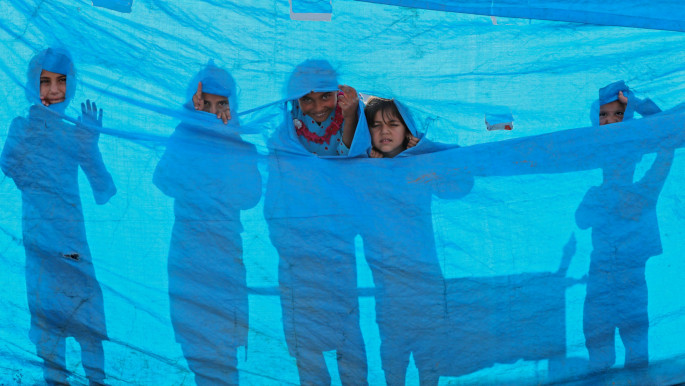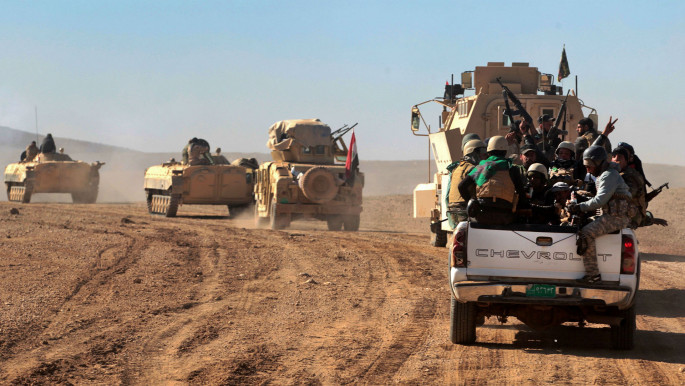The Iraq Report: Human rights ignored as IS battle drags on
Click here to receive The Iraq Report each week in your inbox
As the Iran-backed but Iraq-sanctioned Shia militias under the umbrella of the Popular Mobilisation Forces continue to clear areas along the Iraqi-Syrian border, two of Iraq's biggest political players have stepped up their efforts to court them – and by extension Iran - before local elections are due this year.
Iran's dominance of Iraq's political and security scene shows how its role as kingmaker has only been enhanced in recent months.
Areas of Iraq are seemingly being left to the Islamic State group by PMF militants who are keen on achieving extraterritorial military aims in Syria at Iran’s behest. The drive to fight in Syria and for Iraq's top job has also brought Iraqi human rights abuses back to the fore, as international human rights organisations expose extra-judicial executions, while refugees from IS violence continue to face arbitrary detention in Iraqi Kurdistan.
One week later, IS still undefeated in Mosul
Although the Iraqi authorities have claimed that the battle of Mosul would end within a week, and Prime Minister Haider al-Abadi reportedly ordered preparations for celebrations, their self-imposed deadline has now expired, with IS still firmly entrenched in Mosul's labyrinthine Old City.
This is now the fourth deadline that has passed, in what has now become a recurring pattern of either Abadi or military officials promising to defeat IS by a certain time, only to fail.
Abadi had originally promised to recapture Mosul by New Year's Day, and when he failed to do so, Lieutenant-General Talib Shaghati said that Mosul would be taken by mid-April at the latest. When this also failed to materialise, Iraqi Chief of Staff Lieutenant-General Othman al-Ghanmi said, on 30 April, that the operation would end "in a maximum of three weeks". Now that the "one week" deadline has also passed, it is likely to cause some embarrassment in Baghdad.
The reason for Iraq's inability to conclude the operation could be due to the sheer attrition that it has suffered. Iraqi forces have lost upwards of 8,000 men, according to a report by Al Jazeera in April - a figure accounting for Iraqi army and police, but not including fatalities suffered by the PMF, Kurdish Peshmerga and other units involved in the 100,000-strong force.
Since April, these fatalities have almost certainly increased, not to mention the thousands wounded in action.
These continued failures have led UNICEF to declare that 100,000 children "remain in extremely dangerous conditions in the Old City and other areas of west Mosul". These dangers are further exacerbated by the fighting itself, with indications that the Iraqi military used white phosphorus munitions in civilian areas, while IS was accused by the UN of killing 163 civilians trying to flee - both crimes under international law.
 |
|
| Some 100,000 children 'remain in extremely dangerous conditions in the Old City and other areas of west Mosul' [AFP] |
Fears of sectarian cleansing
As the battle for Mosul rages, the Shia-dominated PMF - known as the Hashd al-Sha'abi in Arabic - are the centre of attention in Iraqi news this week, as they press ahead with their offensive to clear Iraq's border areas with Syria.
The PMF managed to successfully retake the al-Baaj district on Sunday, an area close to the Syrian border south of Sinjar. PMF units had begun an operation in early May to capture al-Baaj and Qayrawan, Qayrawan captured on 23 May. With the capture of al-Baaj, the PMF will likely move further south and attempt to retake al-Qaim, a town on the Iraqi-Syrian border in Iraq's Sunni-dominated western Anbar governorate.
Once al-Qaim is secured, there is a possibility that the Iran-backed fighters may cross the Syrian border to meet up with other Shia fighters advancing towards al-Tanf in Syria, according to a statement released on Monday by a PMF spokesman. An offensive into Syria would help achieve the "Iranian dream" of connecting its territories to the Mediterranean Sea, and which Sunni Arab tribal leaders fear could lead to a sectarian cleansing campaign in their territories.
Such an advance could upset regional actors, as well as international powers such as the United States, which currently supports members of the Free Syrian Army at al-Tanf. Abu Mahdi al-Muhandis, a PMF commander, was shown in a video declaring that his men had reached the Syrian border and would continue advancing "until Riyadh", the Saudi Arabian capital. Al-Muhandis is blacklisted as a terrorist by the US.
Jockeying for power, ceding sovereignty
Rivalries within the ruling Shia Islamist Dawa Party are continuing to provide further opportunity for Iranian influence to build. Although both Vice-President Nouri al-Maliki and Prime Minister Haider al-Abadi are from the pro-Tehran Dawa Party, they have been political rivals since Abadi replaced Maliki as prime minister in 2014.
The vice-president is insisting that local elections go ahead this September, while Abadi's camp is attempting to stall the vote until the Independent High Electoral Commission - seen as being pro-Maliki - can be changed.
Maliki has reportedly forged alliances with several factions within the PMF seeking political office, and the electoral commission recently validated the infamously sectarian Asaib Ahl al-Haq (AAH) militia's application to form a party to contest the elections.
While AAH - one of the most powerful factions within the PMF - is seen as being close to Maliki, Abadi has also been courting the militants by continuing to give them a free hand in how they operate west of Mosul. In addition, the prime minister is technically the commander-in-chief of all Iraqi forces, including the PMF, yet has not censured Abu Mahdi al-Muhandis for threatening Riyadh.
In conjunction with the PMF's military operations and increasing clout, these political moves by the two main Shia political personalities show that Iran's influence as a kingmaker has grown. This reduces overall confidence in an Iraqi political process already marred by corruption scandals, including a parliamentary transparency committee member stating that 40 percent of lawmakers had fake degrees and doctorates.
 |
|
| Pro-government forces advance during the offensive to retake the western side of Mosul [Getty] |
Human rights continue to plummet
Following a series of scandals related to abductions, rape and torture uncovered by The New Arab, Der Spiegel and others last month, Human Rights Watch (HRW) said on Sunday that it had documented extrajudicial executions committed by Iraqi government forces in Mosul.
According to HRW, a Sunni unit within the PMF was responsible for rounding up dozens of suspects and killing them in cold blood before dumping them in the Tigris River. HRW said that the sites of the executions - all of which were in government-held territory - gave a worrying indication about government culpability in war crimes or crimes against humanity.
Iraqi authorities have not yet released details about the number of people being detained, investigated or charged, or even the results of any investigations. HRW's report of prisoners being executed corresponds with the apparent admission of extrajudicial executions by former Iraqi national security adviser Saad al-Muttalibi during a televised interview with TRT World, reported by The New Arab last week.
Showing disaffection with the pro-Iran government, an Iraqi Shia hacktivist was reported arrested by the National Security Service (NSS) last Friday after he had hacked the intelligence agency's website. Reportedly frustrated by the government's inability to provide security and safety for all citizens, Hussein Mahdi left a message on the NSS website, stating: "The National Security Service is neither national nor secure, unfortunately it is corrupt and cronyistic."
However, detention of activists, arbitrary arrests and enforced disappearances are not unique to Baghdad-controlled areas, but also in territory controlled by the Kurdistan Regional Government (KRG). Human Rights Watch released a report on Saturday detailing how Kurdish security forces had been rounding up refugees fleeing the violence in Mosul and detaining them incommunicado for periods as long as four months.
The KRG's alleged treatment of refugees will also increase pressure on incumbent President Masoud Barzani. Rather than presiding over a system of democratic elections, Barzani has been in power in Erbil since 2005, while his term of office ended in 2013. Parliament granted him an extension of two years, but he has since maintained his presidential powers, raising questions about the KRG's commitment to democratic transition.
The Iraq report is a new weekly feature at The New Arab.
Click here to receive The Iraq Report each week in your inbox





 Follow the Middle East's top stories in English at The New Arab on Google News
Follow the Middle East's top stories in English at The New Arab on Google News


